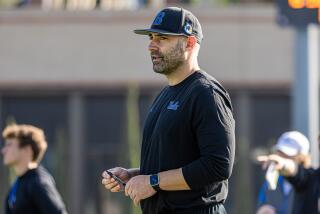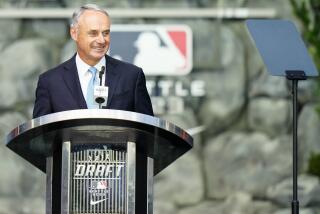Getting Army-Navy Game to Meadowlands Took Six Years of Work
- Share via
EAST RUTHERFORD, N.J. — On the surface, it looks fairly cut and dried.
Army last November decided to exercise an option in the contract covering the Army-Navy game, put the 1989 game open to bid and the New Jersey Sports and Exposition and the Meadowlands outbid four cities to host the game.
Sounds straight forward. It wasn’t.
Getting the Army-Navy game to Giants Stadium was a project. Around the Meadowlands, people call it “Bob’s baby.”
It was six years in the making, will cost the New Jersey Sports and Exposition Authority “substantially more than $1 million,” involve 10,000 box lunches and other throw-ins, and was not nailed down until a basketball player-turned-U.S. senator used a full-court press to get some unidentified Washington bigwig to let go of the final strands of red tape.
“I was never quite sure we had it,” Robert Mulcahy, the chief executive officer of the NJSEA, said after the announcement that the game was going to be played at Giants Stadium. “And there were times I was concerned whether we could successfully conclude the negotiations.”
Those negotiations started in November. The wooing by Mulcahy began in 1982.
By that time both academies had played games at Giants Stadium: both schools played Notre Dame and Army met Rutgers.
“In the process of playing those games, we entertained the administrations of both schools several times at which time, in a very subtle way, I indicated we would be interested in playing the Army-Navy game here at some point,” Mulcahy said.
Up until then, the game had been a permanent fixture in Philadelphia.
The wooing continued over the years and Mulcahy said there might have been 30 meetings with officials at the two schools, although he admits contacts might be a better word.
There were little parties for school officials when they were at the sports complex. There was the trip to Cape Cod, Mass., so he could be at a golf outing at which both schools would be represented. There were trips to West Point just to keep the conversations going.
“I probably spent more time on contacts and attempting to put forth the best, I don’t want to say face of the authority, but promoting the authority over a long period of time,” Mulcahy said.
The wooing lasted through the administrations of three superintendents at West Point, and all through it, Mulcahy could only hope that one day the two academies would someday consider a change of scenery.
“You do that with a lot of things here,” Mulcahy said. “I mean I spend a lot of time investing it for the future, just to be in a position to have the opportunity. A lot of this is being in the position when the opportunity arises.”
The opportunity came in November, when Army Athletic Director Carl Ullrich announced that West Point would exercise an option and take bids on the 1989 game.
Jacksonville, Fla., Dallas, Baltimore, Philadelphia and the New Jersey sports authority responded. In the end, it came down to Baltimore, Philadelphia and New Jersey.
“Throughout the entire negotiations, Bob has stressed that our offers have to be more than anyone else,” said Michael Rowe, the general manager of Giants Stadium and the Brendan Byrne Arena. “We didn’t want our offer to be the same as Philadelphia or less than Philadelphia. We didn’t want more to be an issue.”
Mulcahy said the one area that separated the sports authority’s offer from any other was a guarantee to both schools.
Sources close to the authority said the academies split a little more than $1 million from last year’s game in Philadelphia. The 1989 guarantee “is substantially more than that and will change how much money these schools get in future deals,” said the source, who would not allow his name to be used.
Mulcahy would not disclose how much money the Meadowlands guaranteed.
“Sometimes people don’t understand why people win things and why people don’t,” Mulcahy said. “One of the things that sets us apart in other things we have won is that we are willing to assume risk.”
Mulcahy said the original NJSEA package included providing enough buses to transport both corps to the game, box lunches for all the cadets and hotel rooms for official academy parties. He said the only refinements were the decision to put on a concert for cadets and midshipmen after the game, and to hold a formal gala the night before the Dec. 9 game. The gala will honor former participants in the game, which will celebrate its 90th anniversary next year.
The last two items, coupled with the guarantee, sealed the deal. But even then Mulcahy had to sweat it out. He thought an announcement might come at the beginning of this month.
It didn’t, because of a holdup in Washington, where all contracts for Amry-Navy games get their final approval.
However, somebody was dliberately creating some red tape, preventing the contract from being signed.
Mulcahy said he then contacted U.S. Sen. Bill Bradley, D-N.J.
“It was Senator Bradley’s understanding that things were not moving along,” Nick Donatiello, a Bradley spokesman, said in a telephone interview. “He called people at the Pentagon and encouraged them to put the game at the Meadowlands.”
Donatiello would not say who Bradley spoke with, adding the Senator made no deals to get the game at the sports complex.
The game will return to Philadelphia for three more years starting in 1990, but Mulcahy said the New Jersey sports authority would like to have the game again, adding a logical rotation of the game would be to play it one year in Baltimore, one year in Philadelphia and one year at the Meadowlands.
“The Army-Navy game is one of those national events that is part of the greatest tradition of American intercollegiate athletics,” Mulcahy said. “You have students playing the game, a tremendous rivalry and national interest. . . . It is a world-class event.”
More to Read
Go beyond the scoreboard
Get the latest on L.A.'s teams in the daily Sports Report newsletter.
You may occasionally receive promotional content from the Los Angeles Times.










